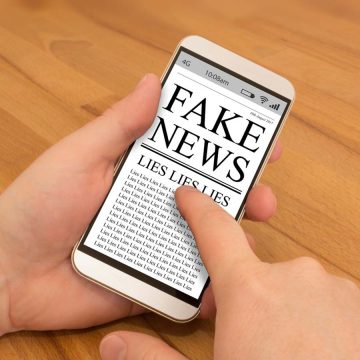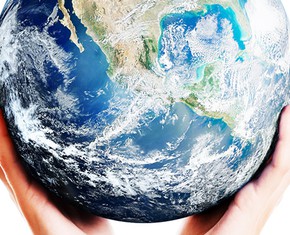The views expressed in our content reflect individual perspectives and do not represent the authoritative views of the Baha'i Faith.
Fake news! The accusations fly around our heads like angry wasps. Conflicting headlines driven by political bias and simple manipulation assault us from every direction.
The cries of “liar, liar, pants on fire” fill the airwaves and the internet. Everyone asks: “Who do I believe? Does all news contain bias, misrepresentation or outright fabrications?”
Baha’u’llah, with amazing foresight, wrote about the influence and power of the press more than a century ago, attempting to educate reporters and editors regarding the importance of simple truth and integrity. He said:
In this Day the secrets of the earth are laid bare before the eyes of men. The pages of swiftly-appearing newspapers are indeed the mirror of the world. They reflect the deeds and the pursuits of divers peoples and kindreds. They both reflect them and make them known. They are a mirror endowed with hearing, sight and speech. This is an amazing and potent phenomenon. However, it behoveth the writers thereof to be purged from the promptings of evil passions and desires and to be attired with the raiment of justice and equity. They should enquire into situations as much as possible and ascertain the facts, then set them down in writing …
Fair speech and truthfulness, by reason of their lofty rank and position, are regarded as a sun shining above the horizon of knowledge. The waves rising from this Ocean are apparent before the eyes of the peoples of the world and the effusions of the Pen of wisdom and utterance are manifest everywhere. – Tablets of Baha’u’llah, pp. 39-40.
Abdu’l-Baha was also no stranger to the news media. When he traveled to Europe and America in the years between 1910 to 1913, newspapers, journals, magazines, films and bulletins of the era referenced him nearly 1100 times. He realized their import to society and the grave responsibility of the professionals responsible for producing their content.
Abdu’l-Baha’s advice to the press appeared in the Chicago Daily News after a meeting with interviewing journalists:
A reporter must be a purveyor of truth. The newspapers are leaders of the people and the people must be able to rely on what they read … – Amin Egea, The Travels of Abdu’l-Baha and their Impact on the Press, A Survey, Amin Egea, p. 15.
 Yes, it’s important to have a reasonable level of confidence in the media, but why? Our civilization depends on them to accurately “mirror the world.” They inform our thoughts and many times the decisions we make, and even the decisions our leaders and policymakers make.
Yes, it’s important to have a reasonable level of confidence in the media, but why? Our civilization depends on them to accurately “mirror the world.” They inform our thoughts and many times the decisions we make, and even the decisions our leaders and policymakers make.
However, media outlets exist today that really pose as entertainment, and their content is given license to not always be factual.
From a Baha’i perspective, the media must be objective in its news reporting to warrant trust, and trust is crucial to society. For example, if any particular danger is discounted, minimized or maximized to further a personal political view, prejudice, belief or agenda, it can have grave consequences to those who believe.
If it is a physical danger there may be a refusal to seek necessary safety. If it is a perceived danger to a way of life, a process to divert and scapegoat can begin that hides the real issues that need to identified and remedied. A contagion of disunity spreads itself through our families, communities and societies.
Further comments by Abdu’l-Baha about journalistic ethics were reported In the Philadelphia Public Ledger:
Journalists must write significant articles, articles that shall foster the public welfare. If they so do they will be the first agents for the development of the community.
Newspapers must investigate the means for the progress of humanity, and publish them. – Ibid., p. 16.
So the goal of journalists and newspapers is to produce a product that advances the societies in which they live. This important goal elevates the information they provide into a valuable service to humanity, instead of the idle gossip, speculation and valueless trivia that often dominate the news media today.
Before we can blame the media for the maze of confusion we live in, Abdu’l-Baha left us with a sobering thought: “We may ascertain the progress or the retrogression of a nation by its journalism.” – Ibid.
Does the news media simply reflect who we are? We may fairly ask ourselves, since we vote with our attention and money, does what we consume as news serve truth and reliability, foster public welfare, develop communities, and investigate the means for the progress of humanity; or does it dumb down and encourage our fear and prejudice?
We now have the maturity, the intelligence and the knowledge to independently investigate for ourselves and answer these questions, determining if our choices are “sanctified from the prejudice of egotism and desire,” and “adorned with the ornament of equity and justice.” We can refuse to buy, support, tune in, and read media that don’t live up to those standards. We can delete, dislike, thumbs down and not participate in destructive discussions and, finally, support better choices. If we can ascertain the progress of a people through its journalism, then it’s our responsibility—each and every one of us—to reward equity and fairness with our attention, our support and our trust.
















Comments
Sign in or create an account
Continue with Googleor